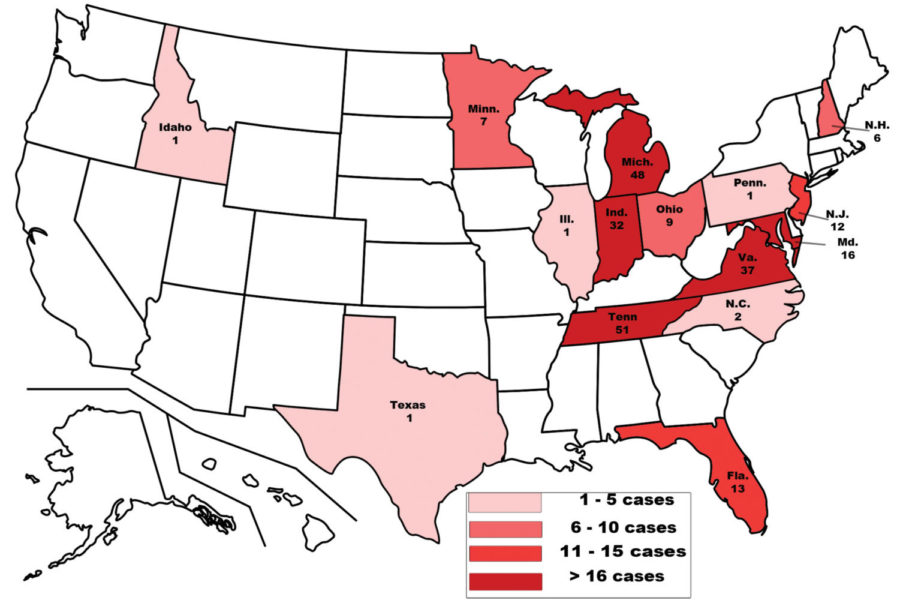Fungal meningitis not immediate threat to ISU students
Graphic: Megan Wolff/Iowa State Daily
Meningitis cases per state as of Wednesday, Oct. 17. Iowa has no identified cases, and fungal meningitis is not contagious.
October 18, 2012
The Centers for Disease Control and Prevention, the Food and Drug Administration, and local and state public health departments are currently investigating a multistate meningitis outbreak. Meningitis is an inflammation of the membranes that cover the brain and spinal cord.
As of Tuesday, Oct. 16, 233 patients had been infected and 15 had died. Those numbers are expected to rise.
“[Symptoms are] not going to spring up overnight, so I think there is going to be quite a few more people on that list at some point,” said Laura Knowles, supervisor for nursing and patient services at Thielen Student Health Center.
The current form of meningitis is fungal. Fungal meningitis is when fungal organisms invade the the fluid surrounding the spinal cord and brain, or the brain’s blood vessels.
This outbreak of fungal meningitis is caused by a steroid injection of a potentially contaminated product, given in the back, knee, shoulder or ankle. The steroid injection was an injection of methylprednisolone acetate.
“As a health care provider one of the first questions that you have … is ‘How did it get contaminated?’ You want to know why,” said Tammy Paris-Walker, staff registered nurse at Thielen Student Health Center.
The steroid injection was produced and sent out by the New England Compounding Center in Framingham, Mass. These injections were recalled Sept. 26. However, since this is an injection, once patients have received the steroid, the fungal meningitis may already be in their body.
The best thing to do is to watch out for the symptoms of meningitis: fever; headache; chills; very severe, stiff neck pain and problems similar to those of a stroke. Symptoms may appear one to four weeks after the injection was received.
“One of the questions that [a student patient] will always be asked by the nurses is ‘Can you tip your head down to your chest?’ and ‘Does that increase any pain?’” Knowles said.
Fungal meningitis is not contagious. The people contracting this illness are the people who received the steroid injection from New England Compounding Center.
“We were glad that it was fungal, because right away we know the risk of spreading is virtually nil. It’s not going to be contagious from person to person, so that is a huge relief from a public health standpoint,” Knowles said.
Treatment for fungal meningitis includes two drugs, one called amphotericin B and the other is voriconazole.
Some patients will fully recover, but others may have lasting mental or physical problems relating to a stroke or issues with antifungal medications.
The student health center at Iowa State feels that they are in a supportive role. There have not been any cases of fungal meningitis reported in Iowa.
“We’re in more of a supportive role with public health because we don’t do the procedures, but should something like that happen and we have Ames’ community population affected, then we would certainly jump in and help Story County Public Health with the response. Right now we don’t have anything directly that we can do, but we would certainly help them in any way possible,” Knowles said.
The student health center stresses that for students on campus, this issue should not raise immediate alarm.
“It’s not a huge concern for our students right now by any means,” Paris-Walker said.
However, with the large diversity of the Iowa State campus, the student health center realizes that this may affect some students.
“You’ve got to think, we have kids from 130 different countries and all across the United States; someone’s family will probably be affected,” Knowles said.







